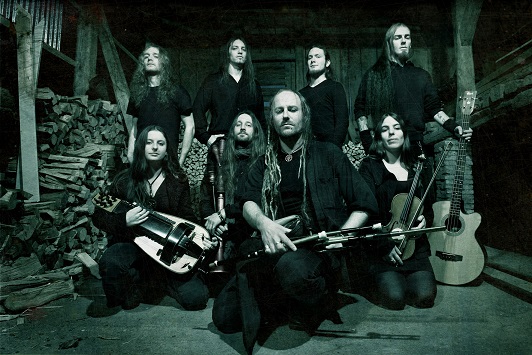Blistering.com: New production team for Everything Remains (As It Never Was). What prompted the move away from Jens Borgen and over to Tommy Vetterli (ex Coroner)?
Glanzmann: Each time you record and release an album, you have a chance to learn something new about the experiences. We tried to learn as much as we can about recording and producing and get profit from these experiences. Tommy is from Switzerland as well. We were thinking of him for Slania, but these things are always difficult. This time, it was the idea of our managers and they had Coroner back then, so they’re good friends with Tommy, so they suggested him. We went into the studio with him and he’s just totally…looking back after having recorded with him, I’d say he’s one of the best engineers in the world. He’s not recognized as others, but I think he’s genius.
Blistering.com: Do you see the new album as a continuation of Slania?
Glanzmann: Not on purpose. We have this acoustic album in between, which was special, so with the new album, we went to the other side, basically. We played countless shows all over the world and it’s natural you grow together and you develop musically. I think you can hear that on the album, but it’s not some continuation in some conventional way.
Blistering.com: The album title, is there some type of double-meaning there?
Glanzmann: The album has a collection of stories from ancient Gollium and I think it’s important when dealing with history is that no one, can exactly say how things have been. In a way, every generation of history can always be a little romantic in a way. Of course it’s possible to really look at an ancient culture, but the picture you get, even if you look at it beautifully, is and probably will be blurry. Like a mirror image on the surface of a lake. No one had lived during that time. No one met and fought the people. That’s a critical approach, for me, when writing lyrics when dealing with all of those historical incidents. There is a lot of questioning.
I think [misrepresentations] happen quite often. Everybody should has their own mind and idea and get their own picture of everything. We’re not messengers; we don’t want to preach [laughs]. It’s more of the way weapproach history.
Blistering.com: Describe the work that goes into using a dead language.
Glanzmann: Mostly we use original texts and sounds, which means they’re over 2,000 years old. That’s actually the main thing, the ones applied to Gaulish texts, they’re original ones. We always work with scientists for explanations and pronunciations. The whole topic and culture is a passion of mine.
Blistering.com: For a band that spends so much time on the road, how have learned to adapt with a crowded bus and stage?
Glanzmann: Pretty well. We have eight people, if you go on tour with a band for a long period of time, getting along together and working together in a good and productive way…these are the things you have to learn anyway. This is the same if you have three people or eight people. It doesn’t make that much of a difference. The last four years or so, we did spend so much time whether it’s on the road or in the studio. A lot of us have the same interests or friends just because of the band. The last couple of years we grew together anyway; we’re almost like a family.


